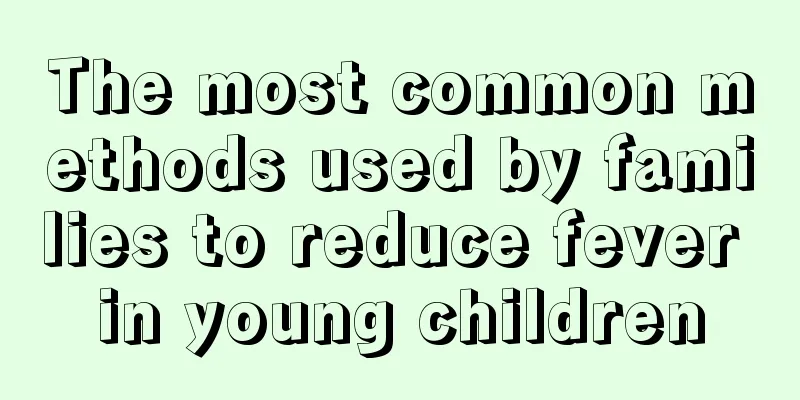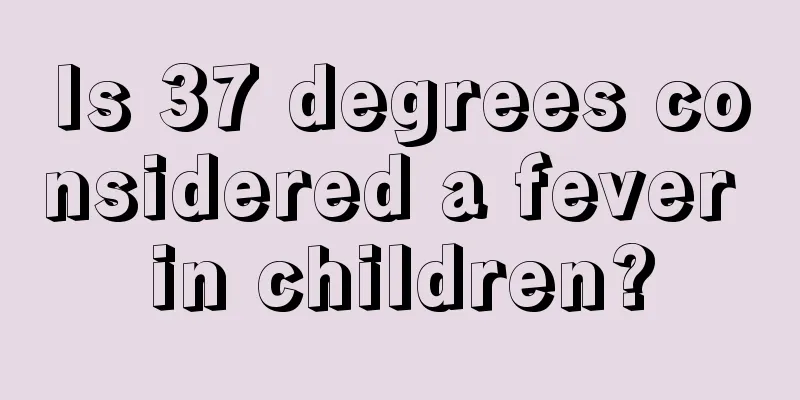The most common methods used by families to reduce fever in young children

|
Fever in young children is a relatively common disease at present. Since infants and young children have relatively poor resistance, they are particularly susceptible to infection by viruses and bacteria. Therefore, many children are particularly prone to fever. Therefore, many parents want to know the most commonly used methods of reducing fever in young children at home. In order for you to master them as soon as possible, let’s take a look at the introduction below. 1. Maintain air circulation in the home: If the home has air conditioning, maintain the room temperature between 25-27℃. You can place the child in an air-conditioned room or blow an electric fan around him to slowly lower his body temperature, which will make the child feel more comfortable. But if the limbs are cold and the patient is shivering violently, it means that the patient needs warmth, so cover him with a blanket. 2. Take off too many clothes: If the baby's limbs and hands and feet are warm and the whole body is sweating, it means that the baby needs to dissipate heat, so he can wear fewer clothes. 3. Warm water bath: Undress the baby and rub the whole body with a warm water (37℃) towel. This will dilate the blood vessels in the baby's skin and release body qi. In addition, when water vapor evaporates from the body surface, it will also absorb body heat. 4. Use a cooling patch: It helps dissipate heat, but it is not recommended for younger children because it is difficult for them to turn their bodies, and an ice pillow can easily cause local overcooling or hypothermia. You can also use a cooling patch. When the water in the gelatinous substance of the cooling patch evaporates, it can take away the heat and will not cause excessive cooling. Note: Cooling patches are generally suitable for preschool children, but be aware of the misunderstandings in the use of cooling patches. For example, cooling patches can only physically reduce the temperature, and fever caused by viral colds should be treated promptly. In addition, the physical properties of the cooling patch determine that its cooling effect is good but the process is slow. The entire cooling process will last from 15 minutes to 4 hours. You should be cautious about the so-called cooling patches advertised on the market that can cool down in 1 minute or 15 seconds. 5. Drink more water to help sweating and prevent dehydration. Water has the function of regulating temperature, which can lower body temperature and replenish water lost in the baby's body. 6. Use antipyretics: When the core temperature (rectal temperature or ear temperature) of an infant or young child exceeds 38.5°C, you can use antipyretic solutions or suppositories appropriately. The most commonly used methods of reducing fever for young children in families are introduced above in detail to many families. Therefore, for many parents, when their children have a fever, they can use the above most commonly used methods of reducing fever for young children. By taking such methods to reduce fever, not only can the fever be reduced as soon as possible, but there will also be no side effects. |
<<: Five physical methods of reducing fever in children without side effects
>>: Solutions for newborn baby frowning
Recommend
Characteristics of premature babies
Premature birth has a very adverse effect on the ...
What to do if a one-year-old child has a fever
A one-year-old baby refers to a one-year-old baby...
How to treat phimosis in children?
It is common for boys to suffer from phimosis whe...
What should I do if my child has red spots on the palms of his hands and they itch?
Children's skin is very delicate. If you don&...
Is it normal for children to change their teeth at the age of six?
What many parents care about most is their childr...
Does diaper rash itch?
Nowadays, many mothers use diapers for their babi...
What's wrong with the white skin on the child's leg?
Children in their early childhood are very prone ...
Does hernia in children require surgery?
Children’s illness is the biggest worry for paren...
What is the normal body temperature for a 3-year-old baby?
Babies with poor resistance often suffer from col...
How to take care of a baby who has a fever and keeps crying
For most babies, crying is a very normal thing, b...
Can children eat tofu?
Children are always picky eaters. This is because...
The reason why a bump suddenly grows on a child's head
Children's heads are particularly sensitive. ...
What to eat for children with indigestion
Children's physical health is a very importan...
Is it normal for a child to poop twice a day?
In the process of survival, various living organi...
Causes of melanin deposition in children
The melanin deposition on the surface of human sk...









